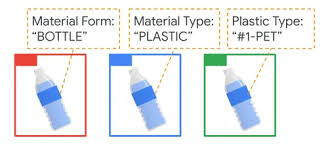
For the past five years, the research teams have worked to bring this commitment to India, and they’ve been deeply encouraged by the enthusiasm and support with which the ecosystem here has partnered with them – adapting their AI to local contexts to help strengthen communities and improve lives.
They’ve even highlighted how India can maximize AI’s potential in their ‘An AI Opportunity Agenda for India’ whitepaper.
Today, they’re excited to announce new collaborations across health, agriculture and sustainability sectors that will deploy our AI across a range of applications: from helping prevent blindness amongst people with diabetes, to supporting field-level insights that eventually benefit farmers, and even reducing strain on the country’s landfills.
Supporting plastic recycling and the circular economy
Plastic recycling is a key lever in climate action, supporting circularity that enables reduced emissions while appropriately and responsibly maximizing use of valuable resources. To assist wider adoption of recycling practices, subsequently contributing to the circular economy, our teams developed CircularNet – an open-source machine-learning computer vision model.
Trained on global datasets and powered by TensorFlow – Google’s free and open-source software library for machine learning and artificial intelligence – CircularNet provides pixel-level instance segmentation, characterizing plastic materials by form and type, to improve how they are sorted, managed, and recycled across the entire waste management cycle.
Saahas Zero Waste (SZW), a Bangalore-based environmental and social enterprise, has been leveraging CircularNet in its efforts to sort plastic waste, improve recycling, reduce strain on landfills from recyclable waste, and strengthen India’s circular economy.
Being used for its material identification capabilities, CircularNet is supporting SZW as a vision-based quality control system that checks quality and quantity of waste before it is sorted, baled and sent to recycling centers, as well as when it is received at the recycling centers.
In a pilot of CircularNet’s AI model at its material recycling facility, Saahas Zero Waste estimates that it realized approximately 85% accuracy in detection of plastic waste. Based on these internal evaluations, SZW predicts the higher quality recyclable materials that are recovered could translate into a 10-12% improvement in revenue generation. They are hopeful that such improved financial viability for material recovery facilities could stand to benefit the many other entrepreneurs in India who operate in this space. Saahas Zero Waste has further estimated that roughly 90% of recyclable waste could be diverted from landfills.
Arun Murugesh, Vice President, Sales and Marketing, Saahas Zero Waste: “Saahas Zero Waste is committed to the evolving waste management ecosystem in India, aiming to responsibly manage over 500 tonnes of waste daily by 2026. Google’s CircularNet model is playing an important role by supporting automated AI-powered quality control systems that can be deployed efficiently at scale - and we’ve been greatly encouraged by early results. Improved quality assurance at waste recovery facilities and recyclers powered by CircularNet promises to improve resource recovery through closed loop recycling. By combining technology with viable business models, we aim to contribute towards India’s vision of a circular economy. We also see AI-assisted partnerships as a driver to achieving larger impact, including livelihood generation, safer working conditions and greater ecological conscientiousness.”





